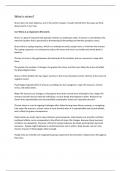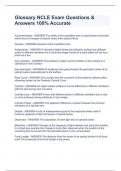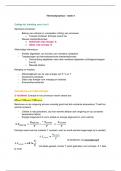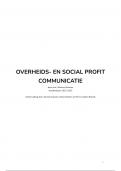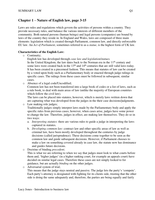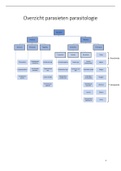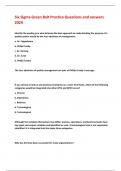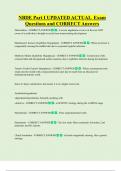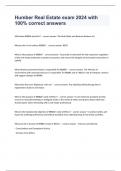What is stress?
Stress does not exist objective, out in the world. Instead, it results directly from the ways we think
about events in our lives.
11.7 Stress is a response to life events
Stress is a type of response that typically involves an unpleasant state. A stressor is something in the
external situation that is perceived as threatening of demanding and therefor produces stress.
Stress elicits a coping response, which is an attempt to avoid, escape from, or minimize the stressor.
The coping response is our attempt to reduce the stress and return our bodies and minds back to
baseline.
The key to stress is the gap between the demands of the situation and our resources to cope whit
them.
The greater the number of changes, the greater the stress, and the more likely the stress will affect
the physiological states.
Stress is often divided into two types: eustress is the stress of positive events. Distress is the stress of
negative events.
Psychologist typically think of stressors as falling into tree categories: major life stressors, chronic
stress, and daily hassles.
Major life stressors are changes or disruptions that strain central areas of people’s lives. Major life
stressors include choices made by individuals, not just things that happen to them. Research has
shown that unpredictable and uncontrollable catastrophic events are especially stressful.
Chronic stress is a set of ongoing challenges often linked to long-term illness, poverty, or caregiving.
Like major life stressors, chronic stress is most harmful when it is unpredictable and uncontrollable,
and it often has grave consequences.
Daily hassles are small, day-to-day irritations and annoyances. Daily hassles are stressful, and their
combined effects can be comparable to the effects of major life changes. Because these low-level
irritations are ubiquitous, the pose a threat to coping responses by slowly wearing down personal
resources. People might habituate to small hassles but not to others. Daily hassles can turn into
chronic stressors if they happen often enough.
People who are members of marginalizes groups experience discrimination related stress throughout
their lives.
, 11.8 Stress has physiological components
A stressor activates two systems, triggering a fast-acting sympathetic
nervous system response and a slower-acting response resulting from a
complex system of biological events known as the hypothalamic-pituitary
adrenal (HPA) axis.
Stress begins in the brain whit the perception of some stressful event.
- The hypothalamus first activates the sympathetic nervous system,
which activates the adrenal glands to release epinephrine and norepinephrine.
- Whitin seconds, the sympathetic nervous system’s response to a stressor enables the
organism to direct all energy to dealing whit the threat at hand.
- Meanwhile, in the APA axis, the hypothalamus sends a chemical message to the pituitary
gland.
- In turn, the pituitary gland sends a hormone that travels trough the bloodstream and
eventually also reaches the adrenal glands
- The adrenals then secrete the stress hormone cortisol, which circulates throughout the body.
- In turn, cortisol increases the amount of glucose in the bloodstream and exerts other effects
that mobilize fast energy sources and prepare the body for injury
Cortisol also had a variety of effect on the immune system, the body’s mechanism for dealing whit
invading microorganisms such as allergens, bacteria, and viruses
Walter Cannon → fight of flight
From an evolutionary perspective, the ability to deal effectively whit stressors I important to survive
and reproduction.
Cortisol circulates throughout the body and to various brain areas, especially the hypothalamus,
hippocampus, and amygdala.
The hormone has different effects on each of the brain regions
- When it reaches the hypothalamus, cortisol triggers a negative-feedback loop to turn of the
HPA axis.
- Cortisol signals the hippocampus and amygdala to encode memory and process emotions
relates to stress.
However, prolonged stress can have paradoxical effects. Brain regions that have receptors for
cortisol can become less sensitive to the effects of cortisol over time if they are exposed to it too
often.
Studies of stress show that excessive stress disrupts working memory, an effect is that especially
noticeable when the demands on working memory are high.
Chronic stress had also been associated whit long-term memory impairments.
Excessive control damages neurons in brain areas such as the hippocampus, which is important for
storing long term memories. Stress also interferes whit the ability to retrieve information from long-
term memory.
Stress does not exist objective, out in the world. Instead, it results directly from the ways we think
about events in our lives.
11.7 Stress is a response to life events
Stress is a type of response that typically involves an unpleasant state. A stressor is something in the
external situation that is perceived as threatening of demanding and therefor produces stress.
Stress elicits a coping response, which is an attempt to avoid, escape from, or minimize the stressor.
The coping response is our attempt to reduce the stress and return our bodies and minds back to
baseline.
The key to stress is the gap between the demands of the situation and our resources to cope whit
them.
The greater the number of changes, the greater the stress, and the more likely the stress will affect
the physiological states.
Stress is often divided into two types: eustress is the stress of positive events. Distress is the stress of
negative events.
Psychologist typically think of stressors as falling into tree categories: major life stressors, chronic
stress, and daily hassles.
Major life stressors are changes or disruptions that strain central areas of people’s lives. Major life
stressors include choices made by individuals, not just things that happen to them. Research has
shown that unpredictable and uncontrollable catastrophic events are especially stressful.
Chronic stress is a set of ongoing challenges often linked to long-term illness, poverty, or caregiving.
Like major life stressors, chronic stress is most harmful when it is unpredictable and uncontrollable,
and it often has grave consequences.
Daily hassles are small, day-to-day irritations and annoyances. Daily hassles are stressful, and their
combined effects can be comparable to the effects of major life changes. Because these low-level
irritations are ubiquitous, the pose a threat to coping responses by slowly wearing down personal
resources. People might habituate to small hassles but not to others. Daily hassles can turn into
chronic stressors if they happen often enough.
People who are members of marginalizes groups experience discrimination related stress throughout
their lives.
, 11.8 Stress has physiological components
A stressor activates two systems, triggering a fast-acting sympathetic
nervous system response and a slower-acting response resulting from a
complex system of biological events known as the hypothalamic-pituitary
adrenal (HPA) axis.
Stress begins in the brain whit the perception of some stressful event.
- The hypothalamus first activates the sympathetic nervous system,
which activates the adrenal glands to release epinephrine and norepinephrine.
- Whitin seconds, the sympathetic nervous system’s response to a stressor enables the
organism to direct all energy to dealing whit the threat at hand.
- Meanwhile, in the APA axis, the hypothalamus sends a chemical message to the pituitary
gland.
- In turn, the pituitary gland sends a hormone that travels trough the bloodstream and
eventually also reaches the adrenal glands
- The adrenals then secrete the stress hormone cortisol, which circulates throughout the body.
- In turn, cortisol increases the amount of glucose in the bloodstream and exerts other effects
that mobilize fast energy sources and prepare the body for injury
Cortisol also had a variety of effect on the immune system, the body’s mechanism for dealing whit
invading microorganisms such as allergens, bacteria, and viruses
Walter Cannon → fight of flight
From an evolutionary perspective, the ability to deal effectively whit stressors I important to survive
and reproduction.
Cortisol circulates throughout the body and to various brain areas, especially the hypothalamus,
hippocampus, and amygdala.
The hormone has different effects on each of the brain regions
- When it reaches the hypothalamus, cortisol triggers a negative-feedback loop to turn of the
HPA axis.
- Cortisol signals the hippocampus and amygdala to encode memory and process emotions
relates to stress.
However, prolonged stress can have paradoxical effects. Brain regions that have receptors for
cortisol can become less sensitive to the effects of cortisol over time if they are exposed to it too
often.
Studies of stress show that excessive stress disrupts working memory, an effect is that especially
noticeable when the demands on working memory are high.
Chronic stress had also been associated whit long-term memory impairments.
Excessive control damages neurons in brain areas such as the hippocampus, which is important for
storing long term memories. Stress also interferes whit the ability to retrieve information from long-
term memory.

